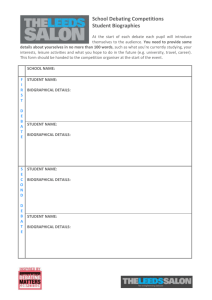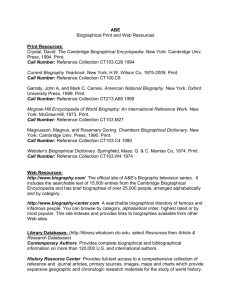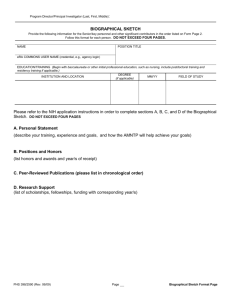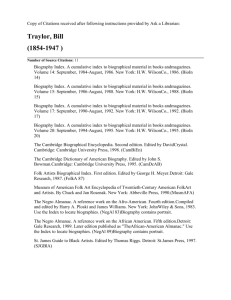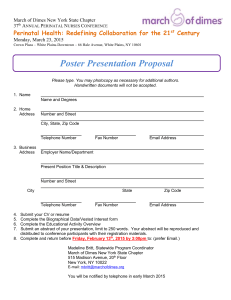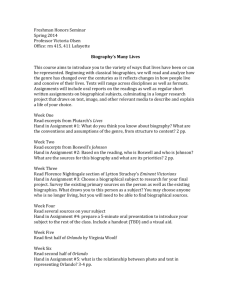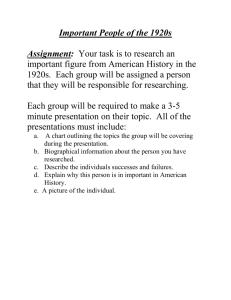Pharmacy Administration 322
advertisement
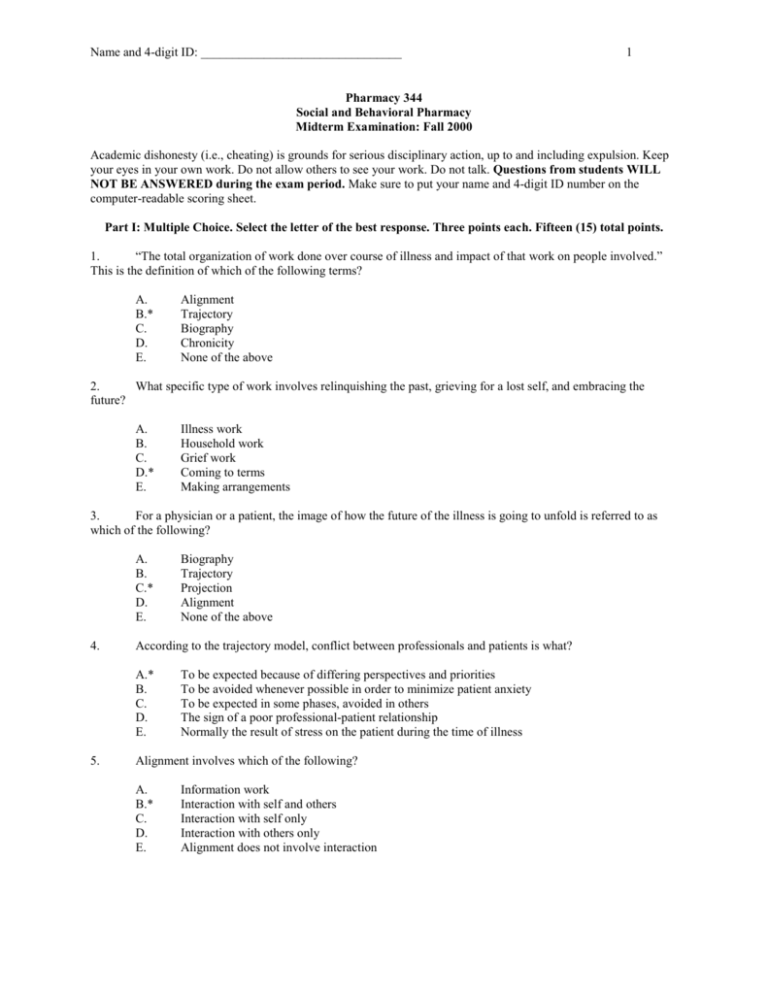
Name and 4-digit ID: ________________________________ 1 Pharmacy 344 Social and Behavioral Pharmacy Midterm Examination: Fall 2000 Academic dishonesty (i.e., cheating) is grounds for serious disciplinary action, up to and including expulsion. Keep your eyes in your own work. Do not allow others to see your work. Do not talk. Questions from students WILL NOT BE ANSWERED during the exam period. Make sure to put your name and 4-digit ID number on the computer-readable scoring sheet. Part I: Multiple Choice. Select the letter of the best response. Three points each. Fifteen (15) total points. 1. “The total organization of work done over course of illness and impact of that work on people involved.” This is the definition of which of the following terms? A. B.* C. D. E. Alignment Trajectory Biography Chronicity None of the above 2. What specific type of work involves relinquishing the past, grieving for a lost self, and embracing the future? A. B. C. D.* E. Illness work Household work Grief work Coming to terms Making arrangements 3. For a physician or a patient, the image of how the future of the illness is going to unfold is referred to as which of the following? A. B. C.* D. E. 4. According to the trajectory model, conflict between professionals and patients is what? A.* B. C. D. E. 5. Biography Trajectory Projection Alignment None of the above To be expected because of differing perspectives and priorities To be avoided whenever possible in order to minimize patient anxiety To be expected in some phases, avoided in others The sign of a poor professional-patient relationship Normally the result of stress on the patient during the time of illness Alignment involves which of the following? A. B.* C. D. E. Information work Interaction with self and others Interaction with self only Interaction with others only Alignment does not involve interaction 2 Part II. Short Answer/Short Essay The best answers are brief and direct. 1. What are two advantages and two disadvantages of a qualitative or ethnographic research method? (4 points) Advantages: Deep description, insider’s view, excellent validity Disadvantages: No randomization or control, poor generalizability, not designed to measure interventions 2. Where does most of the work of chronic illness take place? (1 point) Home 3. What are the three main types of work that chronically ill people must do? Give an example of each type of work. (3 points) Illness work: Doctor visits, following regimens, self-monitoring, undergoing procedures Household work: cooking, cleaning, yard work, etc. Biographical work: engaging in valued activities, doing forward and backward reviews, grieving for loss of self 4. What is an identity-relevant performance? Give an example. (2 points) A performance that is central to the maintenance or reconstruction of one’s identity. For example, acting is an identity-relevant performance for Christopher Reeve (the actor who played Superman and then became paralyzed in a riding accident). 5. How do Corbin and Strauss define health? (Hint: Use their terminology.) (1 point) As a balance between the three elements of the BBC chain (body, biographical time, and conceptions of self). 6. “A set of tasks performed by an individual or a couple, alone or in conjunction with others, to carry out a plan of action designed to manage one or more aspects of the illness and the lives of ill people and their partners.” This is the definition of what concept from Corbin and Strauss? (1 point) Work 7. What are the three phases of the diagnostic phase of a chronic illness? (1 point) Pre-diagnostic, announcement, post-diagnostic. 8. What is the lay referral network? (1 point) It is the collection of friends, family and acquaintances that is normally consulted by an ill person before consulting a health professional. 9. Identify three types of work that need to be done specifically during the pre-diagnostic phase of an illness. (3 points) Making arrangements for exams/tests Managing symptoms Comfort work Biographical reviews Error work Information work 3 10. Give an example of a drug therapy that might upset or disrupt a patient’s biographical work. Describe specifically what the drug is and what aspect of the patient’s biography is threatened. Describe how you as a pharmacist could modify the therapy to take their biographical work needs into account. (3 points) Many examples. For example, SSRIs cause sexual dysfunction, which threatens the biography/identity of any patient who believes an active sex life is an important part of their identity as a spouse or partner. 11. Rachel Barton is a young Chicago woman who has become famous for her violin playing. She is also wellknown for the accident she got into when she caught her arm in the closing door of an El-train. Ms. Barton lost one leg as a result of her injuries, and her other leg was severely injured as well. Explain the impact this accident may have had on Ms. Barton, using the concepts we have discussed in class. In particular, your explanation should discuss body failure, performance, and biography. (5 points) Ms. Barton’s biography was surely severely disrupted by the accident, but the overall impact on her biography was less than it might have been if her arms or hands had been injured. Because violin playing was the central identity-relevant performance in her life, and because the leg injuries did not prevent her from playing the violin, her specific body failures did not intersect with her key identity-relevant performances, and hence she would be expected to eventually feel quite “healthy” since she would be able to pursue the main elements of her own pre-illness life story (e.g., to become a concert violinist and professional musician). 12. Professionals’ and patients’ trajectory schemes are expected to differ in many ways. What are the two most important ways in which they are likely to differ? (2 points) Patients will put more emphasis on quality of life and biographical concerns than professionals. Professionals will tend to emphasize biomedical goals and illness work. 13. What are the main phases of the trajectory model of chronic illness? (1 point) Acute, comeback, stable, unstable, deterioration, dying 14. How does body failure have its effects on biography and identity? (2 points) Through failed performances. 15. What are the so-called ideational processes that are an important part of biographical work? Forward and backward biographical reviews. 16. Define “contextualizing” as a type of biographical work and identify at least three important points about contextualizing as a process. (4 points) Contextualizing refers to the process of integrating the illness and failed body into one’s identity/biography. Any of the following points about contextualizing are important: Depends on phase Happens repeatedly with changes not just once Involves discovering what has been lost, what remains, what can be added All three parts of BBC chain must be contextualized Does not equal acceptance Alternatives are denial, retreat, suicide Continuum of total integration/biographical triumph to total denial/biographical death 17. What is the BBC chain? (1 point) Biographical time, body, conceptions of self? 4 18. point) What aspect of the BBC chain is normally the focus within an “acute care” model of health and disease? (1 The body. 19. What does the coming-to-terms process consist of? (3 points) Confrontation with failed perfromances and subsequent biographical reviews Relinquishing past, grieving lost self, embracing future. Finding/preserving hope (i.e., the perception of an exit) Acceptance not equal to happiness Transcendence may follow acceptance 20. Heart disease, cancer, and stroke are the three leading causes of death in the U.S. They are also all the outcomes of chronic illnesses. Using either heart disease, cancer or stroke, give an example of a common type of body failure that accompanies the illness (or its treatment). Explain the likely biographical consequences of the body failure. Be sure to identify the biographical consequence and explain how it occurred. Be specific. The example you give here must be completely different from your answer to question 10. (3 points) Many examples. 21. The second slide I showed you on the first day of class was titled, “What is this course about?” I listed five things that I thought this course was about. Name four of them. (4 points) Learning how to help people Understanding chronic illness from the “insider’s” point of view Experiencing online communities Understanding health as a balance Understanding complex interactions between self, body, and biography 22. What must the pharmacist-patient relationship be like if you are to have any chance of helping patients with their biographical work? In other words, what are the prerequisites for successful biographical work, in terms of the nature of the relationship and communication patterns between pharmacist and patient? (4 points) Rapport, trust, listening, privacy, negotiation skills, long-term relationship, emotional intelligence and awareness 23. There are three main types of work in chronic illness, and the reading states that these three types of work are “reciprocally interactive”. What does it mean for them to be “reciprocally interactive”. (2 points) Illness work, household work and biographical work are the three types. Each affects and is affected by each of the others. Change in one can bring about change in any of the others, and this process creates a sometimes-stable and sometimes-unstable alignment. Since stability of the overall BBC chain is the goal (and the definition of health), the reciprocal interactivity of the types of work can make it very difficult to maintain stability. 24. Since money and prestige are not normally a big part of caring for a chronically ill loved one, what do spouses and caregivers rely on to keep themselves motivated to work? (2 points) Hope, commitment, common projection and/or scheme. 25. What are the four elements of management in process? (2 points) Calculating resources Maintaining fluid boundaries Planning and coordinating work Sustaining oneself and one another
